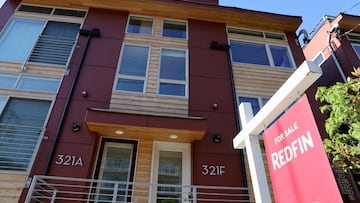Is the housing market going to crash? Here are some predictions from the experts for 2022
The housing market has not seen such rapid rises in prices seen 2007, but are the conditions ripe for collapse?


In early June around 5.8 percent of households in the US were behind on their mortgage or rent. Compared to this time last year, this rate has fallen by around 0.4 percent from 6.2 percent.
Over the past year, the federal government has tracked an eighteen percent increase in housing prices. This is the quickest price increase seen in the market since 1991. Between 2004 and 2006, housing prices increased around ten percent of each year. However, none are seeing a collapse in the housing market on the horizon. The conditions in the market are driven by very different factors, compared to those seen in 2006-2008.
What is causing instability in the housing market?
The price increases are due to inflation which is trending upwards across markets. Since last June, rent prices have increased ten percent but the rate has fallen 0.6 percent April. Cities in Florida have seen the largest increase in rental prices with renters in Palm Beach, Miami, Fort Lauderdale, Orlando, and Tampa are paying more than fifteen percent compared to this time last year. Thirty-four percent of households reported to the US Census that they were likely to be evicted next month. However, if the growth in rent prices continues to slow, these rates of housing insecurity could decrease later in 2022.
More recent price increases are, in part, due to the Federal Reserve increasing interest rates. Earlier this month Chairmen Jerome Powell announced a 0.75 percent increase and stated that the public and investors should expect further bumps in base points in the coming months. These rate increases will make it more expensive to borrower, firms may become less focused on growth and scale back operations, by laying off employees.
Highest percent of residents behind on their mortage or rent
- New York: 11.3%
- Mississippi: 10.6%
- Louisiana: 9.3%
- Delaware: 8%
- District of Colombia: 7.9%
The Federal Reserve has made attempts to ease public stress over a possible recession by announcing that big banks are in a strong position to continue lending to businesses and households.
Larry Summers under fire
Economic Larry Summers has been harshly critized for claiming that the only way to bring inflation under control is for unemployment to increase to 5 percent.
During a speech earlier this month in London he told a crowed that the US needed “five years of unemployment above 5% to contain inflation -- in other words, we need two years of 7.5% unemployment or five years of 6% unemployment or one year of 10% unemployment.” Inflation and unemployment are always in direct motion and an increase in one can often lead to an increase in another. The Federal Reserve can see that inflation is high, so it then increases interest rates, which slows borrowing in the economy, demand falls, firms have to scale back and lay off employees, unemployment increases.
Our economy depends on unemployment and while this notion is often disregarded, there is some truth to the claim.
Larry Summers is wrong. The fix to inflation is to increase domestic production of things we need. Forcing millions into unemployment is cruel and would have disastrous effects across communities—It’s time we say NO to using working people as trading cards in a political game! https://t.co/6BTKKWQhVK
— Joe Sanberg (@JosephNSanberg) June 21, 2022
Related stories
In a sense what Larry Summers is saying is that inflation, in our current economy, means that too many people are working and spending money and since supply cannot keep up with demand, prices are rising. So to slow demand, by reducing their purchasing power, they lose their jobs. And as we know all too well, the unemployment benefits they receive are a fraction of what their salary was; without savings, you will consume less and as such demand will slow.